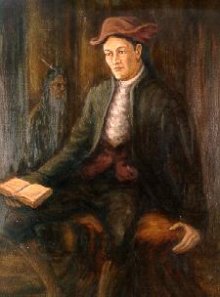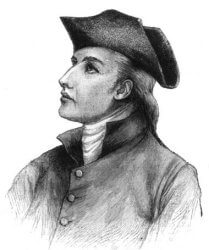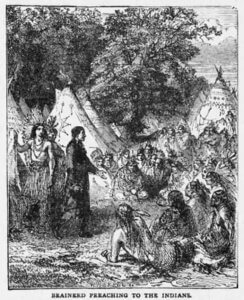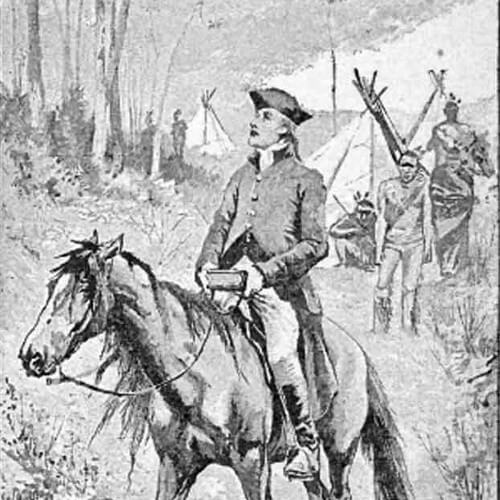David Brainerd was born on April 20, 1718 in Haddam, Connecticut. He died a short 29 years later. For only eight of those years was he a born-again believer in Jesus. For only a short four years did he serve as a cross-cultural missionary. Yet John Wesley said “let every creature read carefully over ‘The Life Of Brainerd’” (a book of his life written by Jonathan Edwards, a leader in the American Great Awakening). Henry Martin said that studying the life of David Brainerd caused “his (Martin’s) soul to be filled with a holy emulation of that extraordinary man; and after deep consideration and fervent prayer, Martin was at length fixed in a resolution to imitate Brainerd’s example.” William Carey said that Edward’s book on Brainerd should be regarded as “sacred text”.
Many others, including Jim Elliott, the missionary martyr, and David Livingstone, the pioneer missionary to Africa, held him “with a kind of awe and drew power from him.” John Piper states “I am tempted to speculate whether the modern missionary movement, that was so repeatedly inspired by Brainerd’s missionary life, would have happened if David Brainerd had not been expelled from Yale and cut off from his hopes to serve God in the pastorate!”
David Brainerd was one of those giants from the past whose life challenged me almost sixty years ago when I began to get serious with God. I am not aware of how many reading this would have heard of him before but I’d like to share some of his life, a life full of struggles, but full of demonstration of the Hand of God.
In this article, I’d like to examine how he overcame obstacles. Firstly to begin his missionary journey in the first place, secondly, the struggles he experienced in remaining faithful to it and finally to examine to what such faithfulness and spiritual impact can be attributed.
One Door Closed, Another Opened
Probably the best place to start would be to unpack John Piper’s comment above. How was this missionary hero expelled from Yale? In my experience, being a Cambridge graduate has meant that the mention of that University has been extremely helpful in opening doors in my service of the Lord, as for example when I applied to teach English at Taiwan University in 1972. How strange then that expulsion, not graduation, from a good university would have a purpose for Brainerd from the Lord. And indeed that expulsion should be in Piper’s view one of the roots, a significant one, of the modern missionary movement.
Brainerd entered Yale to prepare for local pastorate work at the age of 21 in 1739. During his time tension sprang up in the University. George Whitfield and others had visited the area and a number of the students had been set on fire for God. But that zeal was not shared by some of the faculty and staff and they opposed the move of God. In that climate of tension, the University trustees pronounced that “if any student of this college shall directly or indirectly say that the rector, either the trustees or tutors, are hypocrites, carnal or unconverted men, he shall for the first offence make a public confession in the hall, and for the second offence be expelled.”
Not long after that Brainerd was overheard to comment that one of his tutors “has no more grace than a chair” and that he wondered why the Rector “did not drop down dead” for fining students for their love of the Lord. Brainerd was almost immediately expelled from Yale, without hope of return. Simultaneously a law was passed that the door to pastoral ministry was closed unless the prospective pastor had studied at Harvard, Yale or a European University. Brainerd’s expulsion totally excluded him from his plan to be a local pastor, or even possibly a Christian academic. That door was painfully closed.
Brainerd thus had to set out on a new course for his short life, that of being a missionary to the indigenous Indians under the sponsorship of the Society in Scotland for Propagating Christian Knowledge. Thus in November 1742 he was set apart for missionary work. Most significantly, that plan had never occurred to him before his expulsion from Yale. The expulsion both closed one door and opened another, God’s way of leading Brainerd into his calling, to the blessing of the indigenous Indians and the rich benefit of many later servants of the Lord.
So the first lesson we find from David Brainerd’s life is that sometimes the most devastating and extraordinary setbacks, whether they are our fault or the result of actions by others, can under God open to us God’s unexpected calling for our lives.

No Superman
The enormous impact of Brainerd’s life on significant men and women of God who were inspired by his story in later years might cause us to assume that Brainerd was a man of steel. We may imagine a relentless pursuer of his missionary call, impervious to the kind of battles that you and I face. That kind of thinking, seeing missionaries as different from us, not struggling with the burdens that we ordinary humans face, is incorrect and most dangerous. It can lead us to assume two facts that are on the level of deception!
Firstly, that we do not need to pray for our missionaries, as they can do very well on their own without our prayer support. Secondly, that God would never call us to be missionaries because, unlike them, we are not made of spiritual steel.
In fact in Brainerd’s case, the opposite was true. Brainerd’s success was in spite of his struggles, not in the absence of them. Probably he battled giants in his life more than most of us will. John Piper’s short book lists seven struggles that Brainerd faced constantly. I will borrow heavily from Piper’s writing to list them as he has done that so well.
- Brainerd faced constant and serious health problems. He died at the age of 29 of tuberculosis, but even as early as his younger days was forced to drop out of college for some weeks because he had begun to cough up blood. He spoke of being “exercised with a violent cough and a considerable fever, had no appetite to eat any kind of food.” The weeks before his death were of intense pain. His physical sufferings were relentless.
- Brainerd struggled with recurring depression. Piper writes “he was tormented again and again with the blackest discouragements”. He declared that it was different after his conversion – but it still remained to weigh him down, alongside his conviction of the certainty of God’s acceptance and purpose in his life.
- He struggled with loneliness. “I have no fellow Christian to whom I might unburden myself and lay open my spiritual sorrows.” The loneliness was severe enough to cause him to struggle to continue in his missionary calling – “my heart sometimes was ready to sink with the thoughts of my work, and going alone into the wilderness, I know not where.”
- Brainerd battled with immense hardships in his daily life. “I am forced to go or send ten or fifteen miles for all the bread I eat and sometimes it is mouldy and sour before I eat it.” He was frequently lost in the woods and exposed to cold and hunger.
- Brainerd struggled with a bleak outlook on nature. In the pressures of his missionary work the “howling wilderness” was an enemy, not a beautiful source of inspiration. He derived no strength from the witness of nature around him.
- Brainerd struggled to love the Indians to whom he was called. Though the Holy Spirit visited him and gave him “much more kindness, meekness, gentleness and love towards all mankind than ever”, yet at other times he “felt empty of affection or compassion for their souls”, so that he sometimes even felt guilty to preach the gospel to the Indians.
With all these struggles, Brainerd battled to remain true to his calling. He resolved this, despite the offer of a much more comfortable ministry in a local pastorate In East Hampton which seemed so much more attractive than the pain and rigours of the work amongst the Indians.
2 Corinthians 4:7 gives us a significant understanding of what was going on in Brainerd’s life. “But we have this treasure in jars of clay to show that this all-surpassing power is from God and not from us.” The Passion version says: “We are like common clay jars that carry this glorious treasure within, so that this immeasurable power will be seen as God’s, not ours.”
Do we fail to see that God uses broken vessels to His glory? Brainerd’s life proves that no mountain or obstacle is too strong to prevent a somewhat broken life, if it is surrendered to God, from being significantly used by Him. Let his example be an encouragement afresh to pray for any missionaries we know, so that if they are facing some of the mountains which Brainerd faced, yet they might still see God use them in significant ways for the Gospel. And that we might also see that if God calls us to mission, He is Jehovah-Jireh, He is enough.

The Treasure In A Cracked Vessel
Having described the astonishing impact of the life of David Brainerd, and the enormous battles he faced, both with depression and with the physical sickness that took his young life, let us consider this pithy summary from his Wikipedia page:
“David Brainerd was an American missionary to the native Americans who had a particularly fruitful ministry among the Delaware Indians of New Jersey. During his short life he was beset by many difficulties.” (Emphasis added).
“Particularly fruitful”, yet “many difficulties”. So the logical question must arise: how could someone with so many problems and such a short life make such a deep impact?
John Piper considers how Brainerd’s life helped him to press on in the ministry and to strive for holiness and divine power and fruitfulness in his own life. “The answer for me is that Brainerd’s life is a vivid, powerful testimony to the truth that God can and does use weak, sick, discouraged, beat down, lonely, struggling saints, who cry to Him day and night, to accomplish amazing things for His glory.”
What then can we learn from Brainerd’s life?
- The pursuit of God was absolutely first in his life. “It was this unswerving allegiance to the cause of Christ that makes the bleakness of his life glow with glory so that we can understand Henry Martin when he wrote, as a student in Cambridge in 1802, ‘I long to be like him.’” As Brainerd himself said in 1747: “Oh I long to fill the remaining moments all for God!” There was a passion to make God first in His life – that he might know God more. “Oh that I may never linger on my heavenly journey.”
- His commitment to prayer and fasting. Brainerd spent whole days in prayer, or prayed six times in the day, also seeking out others with whom to pray. He prayed “for his own sanctification, for the conversion and purity of his Indians, for the advancement of the kingdom of Christ around the world, for guidance for the next steps of ministry.” When he was dying, he urged other young ministers to engage in frequent days of prayer and fasting because of how effective he himself proved it to be.
- His determination not to swerve from God’s call on his life, however hard that might be. “I could have no freedom in the thought of any other circumstances or business in life. All my desire was the conversion of the heathen, and all my hope was in God: God does not suffer me to please or comfort myself with hopes of seeing friends, returning to my dear acquaintance, and enjoying worldly comforts.” He refused several offers to leave the mission field to become a church minister, which would have led to a much more comfortable lifestyle. That was not God’s call on his life.
- He saw the Lord respond to his prayer and fasting in very clear ways. Reports speak of the Indians falling down, while he preached, weeping under conviction of sin. In 1745 he wrote: “in the afternoon I preached to the Indians and there was much visible concern amongst them. Afterwards when I spoke to some individually the power of God seem to descend on the assembly like a rushing mighty wind and with an astonishing energy bore down all before it. I stood amazed.” That resulted in changed lives – in changed marriages, in release from debt from alcoholism, in refusing to take revenge on past offences. Lives were changed by the power of God. Jonathan Edwards himself said that “among all the many days Brainerd spent in secret prayer and fasting, there is scarce an instance of one but what was either attended or soon followed with apparent success and a remarkable blessing in special incomes and consolations of God’s Spirit, and very often before the day was ended.” God significantly responded to the prayers of His devoted and dependent servant.
- His commitment to indigenous church planting principles. It was about the Indians, not about Brainerd. He describes how after he had gone to bed they continued to worship, how they went out to share the Gospel with other Indian communities. His diaries spoke of revival amongst the congregation not in his own ministry. Increasingly he comments about being uncomfortable with the non-religious white people. “I am more comfortable with my people, the religious Indians.”
“God can and does use weak, sick, discouraged, beat down, lonely, struggling saints, who cry to Him day and night, to accomplish amazing things for His glory.”

One More Secret
But there is another element in his life that is critical to share. It would be easy to say that his devoted commitment to prayer and fasting was the basis of the Holy Spirit’s response. That is true. But there is another fact which we should not miss – Brainerd’s deep and passionate commitment to the word of God.
Piper picks out several quotations from Brainerd’s diaries which reveal that Brainerd was not just a Bible student, but that he spent significant time studying God’s word, often together with prayer and fasting. He was like a man who had found gold but felt he needed to dig longer and deeper because there would be more and richer treasure. Brainerd and the Bible had much more than a passing acquaintance nor did they only meet in a ‘regular’ quiet time. Some examples:
- “December 20, 1745: I spent much of the day in writing; but was enabled to intermix prayer with my studies.”
- “January 7, 1744: spent this day in seriousness, with steadfast resolutions for God and a life of mortification. Studied closely, till I felt my body strength fail.”
- “December 20, 1742: spent this day in prayer, reading and writing; and enjoyed some assistance, especially in correcting some thoughts on a certain subject.”
- “Was most of the day employed in writing on a divine subject. Was frequent in prayer.”
- “I spent most of the time in writing on a sweet divine subject.”
- “Was engaged in writing again almost the whole day.”
- “Rose early and wrote by candlelight some considerable time; spent most of the day in writing.”
- “Towards night enjoyed some of the clearest thoughts on a divine subject that ever I remember to have had on any subject whatsoever; and spent two or three hours in writing them.”
This element of Brainerd’s life encourages us to understand that just a deep experience of the Holy Spirit born of prayer and fasting is not sufficient without a rugged commitment to the Scriptures.
The remarkable man of faith, George Mueller, read through the Bible some two hundred times – and more than half of those were on his knees, praying over Scripture while studying it. The Lord Jesus said: “You are wrong because you know neither the Scriptures nor the power of God” (Matthew 22:29). The equipped man and woman of God needs to know both “the Scriptures” and “the power of God”.
It is said that Smith Wigglesworth, the English plumber who under God became an astonishingly anointed servant of the Lord, prophesied that “when the word and the Spirit come together there will be unprecedented revival.” The word and the Spirit both had major places in Brainerd’s life. He is a striking illustration of the truth of the Lord’s Jesus’ statement.
Surely the Lord yearns in our day to raise up a new generation of Brainerds. Men and women of God who are not committed either to a close relationship with the Holy Spirit or to a life of studying the Scriptures, but rather totally committed to both.
Reflection: What has God done in your life that seemed at the time to be a disaster, but was, in His providence, the door to His sovereign plan for your destiny?



